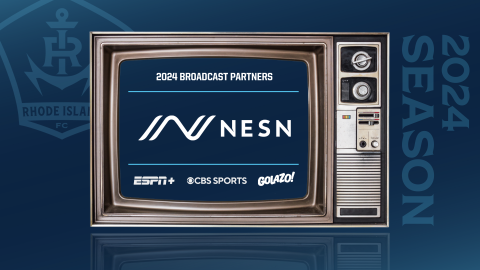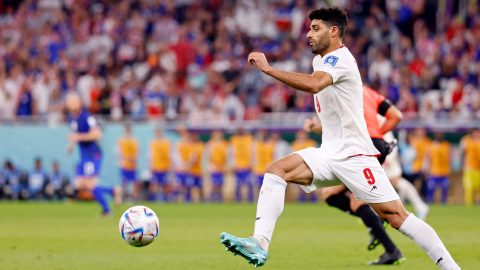The refereeing and beehive horns may have made the World Cup tough to take at times, but the writing is on the wall. If Africa can host soccer’s biggest event, the game can become popular in the United States.
One day.
In 2002, Korea and Japan, two nations with absolutely no soccer heritage hosted the World Cup. Just eight years later, both of those teams advanced out of the group stage. It wasn’t a fluke either. They deserved to. Since 2002, both nations have developed great amounts of talent. It takes just one landmark moment like that to change the course of soccer history for a country. While the U.S. didn’t win it all in South Africa, this tournament was our moment.
Here are the top 10 reasons why soccer should catch on in America.
It’s perfect for TV in the 21st century.
When was the last time you knew you were going to miss the Red Sox game, so you DVRed it, but then you found out what happened on the Internet, radio or from a phone call? Probably 75 percent of the time you try to do it. And then the 25 percent of the time that you get to watch it without knowing what happens, you have to sit there for three hours, even after fast-forwarding 20 commercial breaks.
Soccer is different. If you read a baseball box score thoroughly, you pretty much know exactly what happens. There’s no point watching the game. A soccer box score, though, tells you next to nothing. Furthermore, the DVRed soccer game is the easy viewing. You turn it on, and let it roll for 45 minutes, fast-forward through halftime, and then watch the second 45. It takes about one hour, 40 minutes total, less time than those two episodes of True Blood you need to catch up on would take to watch.
The other interesting thing about the time spent watching soccer — the game is always happening. There are no huddles, timeouts or breathers between pitches. You get one hour and 40 minutes of action. How can you beat that?
‘There’s not enough scoring’ is a lame excuse.
One of the best ones I hear about why soccer will never catch on: “There’s just not enough scoring for Americans to get into it.” Wait, we watch hockey, though? Or baseball? Or basketball, in which the scoring is nearly irrelevant until the fourth quarter in a huge portion of games?This is another common refrain: “It seems like nothing is happening for the entire game. They are just running around in the middle of the field.” What that really means is “I don’t understand soccer, so I am going to discount it.”
Wouldn’t baseball at-bats seem monotonous and lame if you didn’t understand what kind of pitches were being thrown or how the ball-strike count worked? What about football plays in which the running back takes it up the middle for one yard? Or when the puck is stuck in the corner of the rink?
Isn’t part of the joy of watching any sport understanding it? That’s why we take pride in watching those one-yard runs and then saying, “Yeah, they are wearing out the line and opening up the passing game.” The same applies to “all of that running around in midfield.”
Visually, you may not actually have a more stimulating sport than soccer. So many players are constantly on camera, and the sport is as defined by off-ball movement as it is by where the ball itself is. When you’ve seen enough of the game, you can nearly predict the future from all of the visual stimuli available, and you see the little things: a player making a great run, a defender positioning himself perfectly, a midfielder taking a great first touch.
You get why they call it “the beautiful game.”
And how much tension is there in a basketball game with a 10-point margin, a baseball game with a five-run margin or a football game with a 14-point margin? Not all that much, and that happens all of the time. In soccer, the margin rarely ever exceeds one goal. The tension never goes away. You have to keep watching.
The highlights
The list looks something like this: windmill dunks, home run-saving catches, game-winning field goals, kickoff returns for touchdowns, stick saves from outside the crease, diving catches. On a given night, how many of SportsCenter‘s Top 10 fall into one of those categories, and you see the same plays that you’ve seen thousands of times?
Honestly, there isn’t all that much room for creativity in our “big four” sports, but soccer is defined by it. Goals happen in nearly unimaginable ways all of the time. No two highlights are ever the same, and they can be downright crazy. Like this:
And this:
Don’t let the MLS fool you.
You ever go to a high school football game? Unless you were watching a young Michael Vick, you probably weren’t there for the quality of play.
Basically, the MLS is high school football when compared with soccer on an international level. You don’t need to know anything about the sport to get that the league is downright clumsy.
But soccer in South America and Europe is totally different. It’s the NFL. But why would we want to get into something that isn’t American? Well, the best American players go and play in the European leagues — like a bizarro NBA. If people in China watch every Houston Rockets game, and people in Germany love the Dallas Mavericks, why can’t we watch Everton, the English Premier League team of Landon Donovan and Tim Howard?
It’s basically our team, and the level of play is better than you even see in the World Cup.
The personalities
I’m sure that you noticed the same thing during the World Cup. Tons of commercials and announcers screaming: Messi! Ronaldo! Torres! Rooney! Drogba! And then none of them did anything on the field. It was pretty disappointing.
But have you noticed how personality-driven the NBA is? See much of LeBron James lately? Soccer is like that on a global scale, a sport in which its stars are rags-to-riches heroes, growing up playing their sport barefoot on the street before becoming teen phenoms who struggle with immaturity, before finally growing into national icons.
Wayne Rooney may have not been very good in South Africa, but his story and persona is just as compelling as King James’, and Rooney wouldn’t even need his own TV special to prove it.
And if you think the tabloids get a lot of good athlete material at “clubs” with American athletes, soccer stars take it to a whole different level.
The kids and opportunity
What do nearly all of our kids do on Saturday mornings? Play soccer. So how do we not end up with a nation of soccer stars? Because, while soccer may be the best exercise for them, and the safest and easiest sport for them to learn, we convince our children that football, baseball and basketball are where the money is. In America, that’s 100 percent true, but we live in a global economy. It’s not very hard for a great American soccer player to go to Europe and make millions.
What if you don’t want to subject your kids to concussions? Given all that is surfacing regarding the NFL, that should rule out football. What if you and your spouse aren’t 6-foot-4? Basketball is going to be tough. Baseball and hockey? Those sports are pretty hard to make a living in, with zillions of minor leagues in which you can live as a glorified hobo for decades.
With soccer, though, if you are good enough, you can go to Dubai, or Greece, or a country that ends in “Stan” and make a solid living. The market is that big. It’s amazing so few parents have figured that out.
A different kind of fandom
It was pretty miserable when the United States lost to Ghana in that Round of 16 match, but when France, Mexico, England, Brazil and Argentina lost, it was a national crisis.We may think that Americans are the best sports fans in the world, and though we should be, we aren’t. Our sports teams may capture regional pride, but how much “history,” “heritage,” and “identity” do the Tampa Bay Rays really stand for? We know the answer. In Boston, there is a special relationship between community and team because of the history, heritage and identity.
That relationship is the norm in soccer around the world.
Soccer hooligans are real, not because people outside of the United States are crazy and violent, but because people care that much about soccer. Simply put, they would die for their teams. To them, soccer represents geographic and cultural rivalries thousands of years in the making, class warfare (on the club level, teams of the wealthy generally wear blue, while teams of the “masses” generally wear red) and huge amounts of pride. Liverpool, England, isn’t exactly a vacation spot, but its soccer team gives residents something to be proud of on a global scale.
Wouldn’t it be cool if we could care that much about our sports?
The Spain game
The math is pretty simple. Spain is in the World Cup finals. The last time the U.S. played Spain (and it wasn’t some sort of B team), America won in a semifinal of an international tournament.
USA soccer is far more competitive than people think. Americans may not be the favorites to win a World Cup, but they are legitimately a top-15 team with star players who can compete with the best in the world. It isn’t a crazy statement to say: “The U.S. could have won the World Cup in South Africa.” Sure, America wasn’t going to be the favorites, but this land has more than enough talent to beat anybody. The U.S. has proven that already. It may have taken a good draw and a couple of upsets, but USA really is a top- tier soccer country.
The Algeria game
Americans all watched it. We all remember the goal. We all know how we felt, not just as individuals, but as a country. It was something totally new, a different kind of joy. In case you haven’t seen them, check out some clips of people celebrating around the country:
When the 2010 Year in Review material begins to surface, the greatest moment in sports won’t involve football, baseball, basketball or hockey; it will involve soccer. Landon Donovan’s goal was just that special. Even if you have always had your list of 1,000 reasons why soccer isn’t cool, you knew it. That irrational joy, trumping all anti-soccer rationalization, was the tipping point in USA soccer history.
Americans want to be the best in the world
And this is the world’s game. There’s nothing more to say.



